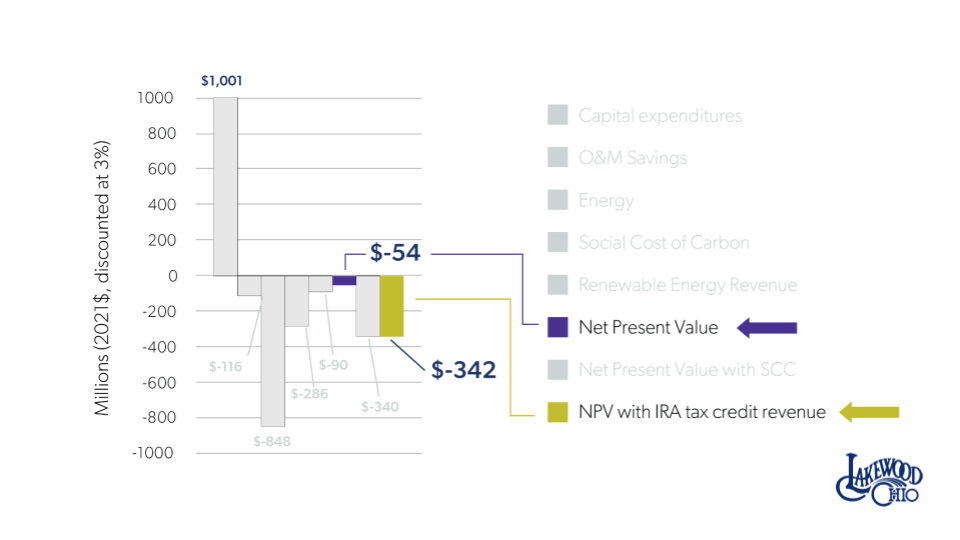How two American cities integrated federal funding into their climate action plans
The influx of federal climate action funds can transform climate action planning in the US—as well as the cost to municipalities. These funds allocated by the Infrastructure Bill and the Inflation Reduction Act, will, by some estimates, release close to two trillion dollars for taking climate action. With such staggering numbers, it can be hard for municipalities to understand how these figures apply to them.
To our knowledge, Lakewood, Ohio, and Ames, Iowa, are the first municipalities to account for federal funding from the Infrastructure Bill and Inflation Reduction Act in their climate action plans—setting them up to save hundreds of millions of dollars by taking climate action. SSG collaborated with the cities to identify the role of specific federal funds through detailed financial modeling.
The cost of climate action is a key consideration for municipalities developing climate actions plans. Forecasting these costs and the potential savings on energy and maintenance costs enables municipalities to build a financial plan and business case for climate action.
In the case of Lakewood, implementing the proposed actions of the plan will require an investment of $1.5 billion but also yield savings of $2 billion over the next 27 years, primarily through reduced energy costs and avoided maintenance expenses. By factoring in funding derived from the Infrastructure Bill and the IRA through programs such as the Low Emissions Electricity Program, Lakewood stands to save $342 million overall. Additionally, programs such as the Greenhouse Gas Reduction Fund, the Neighborhood Access and Equity Grant Program, and the Environmental and Climate Justice Block Grants, provide financial support specific to equity-deserving communities so that they can benefits from climate actions, such as improving insulation in their homes and creating natural infrastructure to reduce heat island effect.
 A graph showing the net present value of Lakewood’s climate action plan with and without IRA tax credit revenue. With the application of IRA tax credit revenue, Lakewood stands to save $324 million through decreased energy and maintenance costs. Negative numbers below the x-axis indicate savings. (Source: City of Lakewood Climate Action Plan).
A graph showing the net present value of Lakewood’s climate action plan with and without IRA tax credit revenue. With the application of IRA tax credit revenue, Lakewood stands to save $324 million through decreased energy and maintenance costs. Negative numbers below the x-axis indicate savings. (Source: City of Lakewood Climate Action Plan).
For Ames, the projected cost of the community’s climate action plan amounts to $3.2 billion, with an anticipated $3 billion in savings from reduced energy, and operation and maintenance costs. But, by maximizing tax rebates from the Inflation Reduction ACT, Ames can reduce the community’s costs by $770 million, bringing it net savings of $500 million. The City can accomplish this by capitalizing on a unique feature of IRA funding: uncapped tax rebates and credits for households and businesses to adopt low-emissions alternatives.These rebates range from 50-100% of the cost of installing new electric appliances, such as heat pumps and induction stoves, to 30% of the cost to install solar panels and battery storage systems, and upfront discounts of up to $7,500 for electric vehicle purchases. By supporting the community in obtaining these tax rebates, Ames can save locals millions.
Beyond the economic implications, both cities recognize the critical role of climate action plans in enhancing the quality of life for their residents. Improvements to active transportation infrastructure, such as the implementation of bike lanes and pedestrian-friendly street lights, not only promote physical activity but also reduce reliance on cars. Electrifying transportation further enhances air quality, which directly impacts the well-being of residents. Additionally, both cities acknowledge that adopting a climate action plan will create job opportunities, particularly in the areas of deep building retrofits and the installation of high-efficiency equipment.
Updates:
The City of Lakewood adopted its Climate Action Plan on May 1, 2023.
The City of Ames unanimously adopted its Climate Action Plan on June 13 2023.
——
To get in touch with SSG to learn more about financial modeling and how we can help your community with climate action, contact us here.









